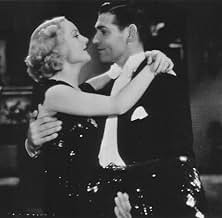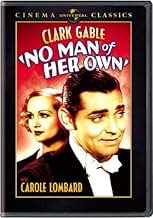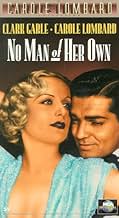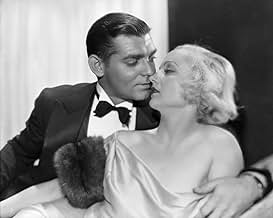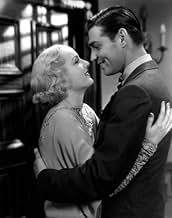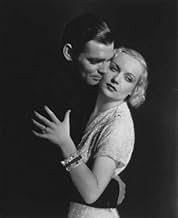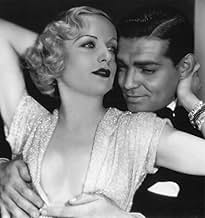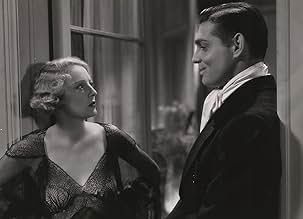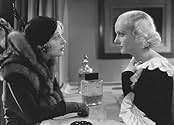AVALIAÇÃO DA IMDb
6,6/10
1,7 mil
SUA AVALIAÇÃO
Adicionar um enredo no seu idiomaAn on-the-lam New York card shark marries a small-town librarian who thinks he's a businessman.An on-the-lam New York card shark marries a small-town librarian who thinks he's a businessman.An on-the-lam New York card shark marries a small-town librarian who thinks he's a businessman.
Sammy Blum
- Door to Door Salesman
- (não creditado)
Mary Bracken
- High School Girl
- (não creditado)
Wallis Clark
- Thomas Laidlaw
- (não creditado)
Lillian Harmer
- Mattie
- (não creditado)
Margaret Marquis
- Girl in the Library
- (não creditado)
Enredo
Você sabia?
- CuriosidadesAlthough Carole Lombard and Clark Gable later became one of Hollywood's most famous couples, they were completely indifferent to one another during the making of this film. It was not until several years later that they met again and fell in love and got married. This was Gable and Lombard's only film together.
- Erros de gravaçãoEarly in the movie, Babe takes a taxi; there is a very clear view of the front hood of the cab, with the telephone number of the cab company. Later in the movie, Babe calls his wife with his new office phone number. He looks at the dial of his new phone and gives her the telephone number of the cab company.
- Cenas durante ou pós-créditosThe cast is shown on a hand of poker cards, with the leads' faces shown as the various cards.
- ConexõesFeatured in The Love Goddesses (1965)
Avaliação em destaque
Recently my favorite video store acquired this movie on DVD, and I was very hopeful in renting it. As I am a huge fan of William Powell and Carole Lombard in "My Man Godfrey," I was astonished to hear the line "See you in church," dropped casually by Lombard in the middle of this film. That line, of course, appears early on in "My Man Godfrey."
I had always thought that this was a comic device, used for that particular film, but apparently it was something of comic parlance in the 1930s. After all, there is a four year spread between this film and "My Man Godfrey". If it still has resonance now, it must have been doubly meaningful to audiences then.
The plot itself is really thin, with Gable's character "Babe" deciding to marry Lombard's "Connie" on the flip of a coin. I don't know whether that was supposed to be THE COMIC DEVICE of the film or whether it was a throw-away notion coming from the screenwriters. It really doesn't matter much because it ruined the whole notion of the film, which is that Gable's "Babe" doesn't want any attachments of any kind to interfere with his life as a card sharp and cheat.
In the social history context, it is very interesting to see a film which shows men of wealth and status in New York City -- in the third year of the great Depression ( counting 1930, '31, and '32 as the epicenter of that disastrous time ) -- casually gambling away sums of money that would easily have sustained a family of four over an entire year !!
Lombard is an intriguing personality in the history of the American cinema and every one of her performances in the '30s speaks volumes about the genius she had contained within herself. She is so wistfully beautiful and her comic timing is usually impeccable. In this film she plays a woman who thinks she is wasting away in her small town, bored with her "unsteady" boyfriend and bored with her job as a librarian. The point is, however, that she was a young woman with a job in the depths of a depression that savaged the whole of the U.S. economy.
For audiences of that era, her character's decision to toss that safety and security for an "instant marriage" to the rogue "Babe" would have been both scandalous and highly romantic. The fact that Gable's very nefarious alternative lifestyle -- as a card sharp and con man -- nets him a plush apartment and plenty of ready money, doubles the scandalous nature of the plot. The fact that he and his confederates fleece the social class known as "New York Swells" accounts for some of the film's popularity in that time and in that era.
But Gable's "Babe" is not some Robin Hood type in a tuxedo. He and his partners cheat the rich and keep the money for themselves.
They are not progressives, they are not "reformers," they are crooks.
This enjoyable film earns a 5 from me for the supporting cast of actors and from Lombard's extraordinary ease of performance. The plot itself is so near to being utter nonsense that only her luminous and magnetic beauty saves the day for the entire ensemble. Clark Gable was the "good guy" with heartburn in "It Happened One Night," which is a far, far superior film. Here, he is just flat out all criminal with heartburn and no better than the bankers of that day, who foreclosed on homes and farms with nary a thought to the long-term consequences to their customers, to society, or to the health of the country which made them so prosperous to begin with. Seventy-five years later, these nuances are probably lost on people who don't know a lot about our true American history. The formulaic "happy ending" tells me that the producers ran out of story before the actors ran out of charisma or talent.
I had always thought that this was a comic device, used for that particular film, but apparently it was something of comic parlance in the 1930s. After all, there is a four year spread between this film and "My Man Godfrey". If it still has resonance now, it must have been doubly meaningful to audiences then.
The plot itself is really thin, with Gable's character "Babe" deciding to marry Lombard's "Connie" on the flip of a coin. I don't know whether that was supposed to be THE COMIC DEVICE of the film or whether it was a throw-away notion coming from the screenwriters. It really doesn't matter much because it ruined the whole notion of the film, which is that Gable's "Babe" doesn't want any attachments of any kind to interfere with his life as a card sharp and cheat.
In the social history context, it is very interesting to see a film which shows men of wealth and status in New York City -- in the third year of the great Depression ( counting 1930, '31, and '32 as the epicenter of that disastrous time ) -- casually gambling away sums of money that would easily have sustained a family of four over an entire year !!
Lombard is an intriguing personality in the history of the American cinema and every one of her performances in the '30s speaks volumes about the genius she had contained within herself. She is so wistfully beautiful and her comic timing is usually impeccable. In this film she plays a woman who thinks she is wasting away in her small town, bored with her "unsteady" boyfriend and bored with her job as a librarian. The point is, however, that she was a young woman with a job in the depths of a depression that savaged the whole of the U.S. economy.
For audiences of that era, her character's decision to toss that safety and security for an "instant marriage" to the rogue "Babe" would have been both scandalous and highly romantic. The fact that Gable's very nefarious alternative lifestyle -- as a card sharp and con man -- nets him a plush apartment and plenty of ready money, doubles the scandalous nature of the plot. The fact that he and his confederates fleece the social class known as "New York Swells" accounts for some of the film's popularity in that time and in that era.
But Gable's "Babe" is not some Robin Hood type in a tuxedo. He and his partners cheat the rich and keep the money for themselves.
They are not progressives, they are not "reformers," they are crooks.
This enjoyable film earns a 5 from me for the supporting cast of actors and from Lombard's extraordinary ease of performance. The plot itself is so near to being utter nonsense that only her luminous and magnetic beauty saves the day for the entire ensemble. Clark Gable was the "good guy" with heartburn in "It Happened One Night," which is a far, far superior film. Here, he is just flat out all criminal with heartburn and no better than the bankers of that day, who foreclosed on homes and farms with nary a thought to the long-term consequences to their customers, to society, or to the health of the country which made them so prosperous to begin with. Seventy-five years later, these nuances are probably lost on people who don't know a lot about our true American history. The formulaic "happy ending" tells me that the producers ran out of story before the actors ran out of charisma or talent.
- Patriotlad@aol.com
- 15 de ago. de 2007
- Link permanente
Principais escolhas
Faça login para avaliar e ver a lista de recomendações personalizadas
- How long is No Man of Her Own?Fornecido pela Alexa
Detalhes
- Data de lançamento
- País de origem
- Idioma
- Também conhecido como
- No Man of Her Own
- Locações de filme
- Empresa de produção
- Consulte mais créditos da empresa na IMDbPro
- Tempo de duração1 hora 25 minutos
- Cor
- Proporção
- 1.37 : 1
Contribua para esta página
Sugerir uma alteração ou adicionar conteúdo ausente

Principal brecha
By what name was Casar por Azar (1932) officially released in India in English?
Responda
